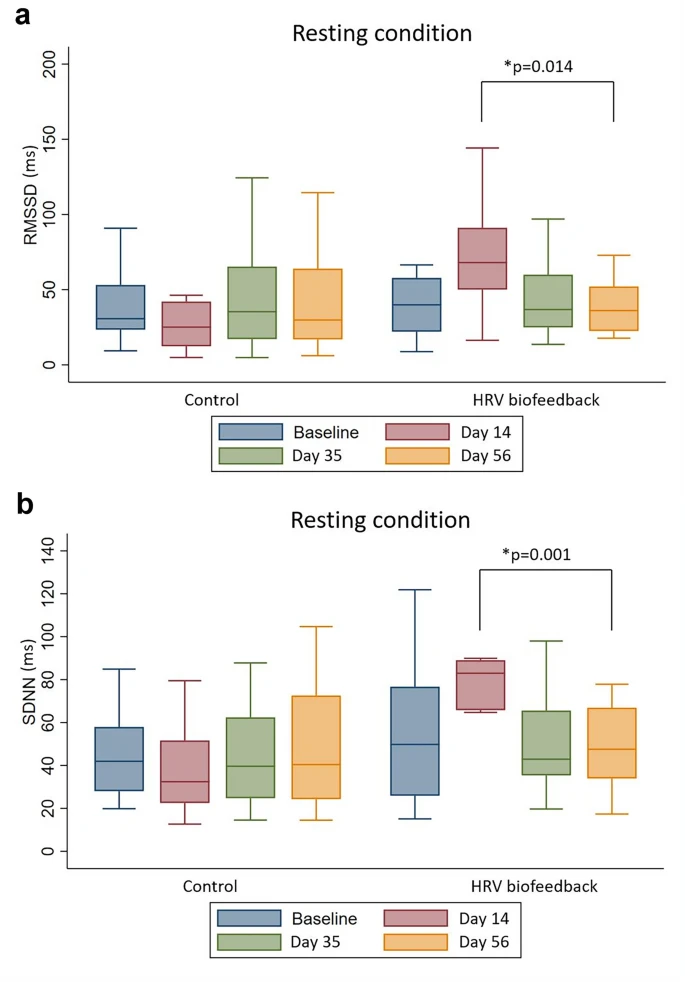Andy
Senior Member (Voting rights)
Abstract
Background
Functional dizziness is one of the most common causes of chronic dizziness. Associated psychiatric diseases such as depression and anxiety lead to significant impairment, possibly due to autonomic nervous system imbalance. We investigated whether heart rate variability (HRV) biofeedback can modulate autonomic function in patients with functional dizziness.
Methods
We performed a randomized controlled study in 24 patients diagnosed functional dizziness for the first time. Patients received six 20 min sessions of HRV biofeedback or no intervention. We assessed HRV (time and frequency domains), sympathetic vasomotor function, sympathetic skin response and psychometric assessments at baseline, immediately post-intervention (or control period) and another 3 and 6 weeks later.
Results
Patients in the HRV biofeedback group showed improved cardiac autonomic function with elevated HRV time-dependent parameters immediately post-intervention [Root Mean Square of Successive Differences (RMSSD): 71.2 ms ± 38 ms vs. 38.2 ms ± 18.5 ms, p = 0.014; Standard Deviation of all NN Intervals (SDNN): 78.3 ms ± 35.9 ms vs. 48.1 ms ± 20.5 ms, p = 0.001], increased HRV frequency-dependent parameter [Low Frequency (LF): p = 0.001], as well as reduced depressiveness (BDI-II: p = 0.0236). None of these parameters were changed in control patients (p = ns). Dizziness-associated symptoms and sympathetic function of vasculature and sweat glands were unaltered in both study arms.
Conclusion
In a randomized controlled pilot study, HRV biofeedback led to improved autonomic cardiac function and alleviated symptoms of depression in patients with functional dizziness, most likely mediated by a predominantly parasympathetic effect.
Open access
Background
Functional dizziness is one of the most common causes of chronic dizziness. Associated psychiatric diseases such as depression and anxiety lead to significant impairment, possibly due to autonomic nervous system imbalance. We investigated whether heart rate variability (HRV) biofeedback can modulate autonomic function in patients with functional dizziness.
Methods
We performed a randomized controlled study in 24 patients diagnosed functional dizziness for the first time. Patients received six 20 min sessions of HRV biofeedback or no intervention. We assessed HRV (time and frequency domains), sympathetic vasomotor function, sympathetic skin response and psychometric assessments at baseline, immediately post-intervention (or control period) and another 3 and 6 weeks later.
Results
Patients in the HRV biofeedback group showed improved cardiac autonomic function with elevated HRV time-dependent parameters immediately post-intervention [Root Mean Square of Successive Differences (RMSSD): 71.2 ms ± 38 ms vs. 38.2 ms ± 18.5 ms, p = 0.014; Standard Deviation of all NN Intervals (SDNN): 78.3 ms ± 35.9 ms vs. 48.1 ms ± 20.5 ms, p = 0.001], increased HRV frequency-dependent parameter [Low Frequency (LF): p = 0.001], as well as reduced depressiveness (BDI-II: p = 0.0236). None of these parameters were changed in control patients (p = ns). Dizziness-associated symptoms and sympathetic function of vasculature and sweat glands were unaltered in both study arms.
Conclusion
In a randomized controlled pilot study, HRV biofeedback led to improved autonomic cardiac function and alleviated symptoms of depression in patients with functional dizziness, most likely mediated by a predominantly parasympathetic effect.
Open access

